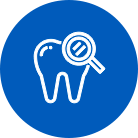
Dentures and ulcers
When you lose your natural teeth it is important to replace them with a set (or partial set) of dentures or ‘false teeth’. These will help you chew and eat food with more confidence and help you retain your normal facial appearance, and give your smile a boost!
Dentures are usually made of plastic or a combination of plastic and metal and although they are custom made to fit your mouth, they can take a bit of time to get used to. New dentures can feel awkward for the first few weeks and may feel a bit loose until your mouth adapts to wearing them. These problems should soon resolve themselves, but let your dentist know if they are worrying you.
Unfortunately, your dentures can sometimes rub, and sore spots can form under them (particularly after eating). When this happens you need to go back to your dentist so they can make the right adjustments.
It is not unusual to experience some minor irritation or soreness at first and you may have to stop wearing your dentures for a little while if your mouth becomes too painful. If rubbing or ill-fitting dentures cause mouth ulcers or oral abrasions, Kenalog in Orabase® can help to quickly relieve pain and inflammation, while healing the sore together with its protective barrier action.
Tips to help you care for your dentures
Good mouth hygiene is important, so clean your dentures every day to remove any food debris and plaque. Rinsing them after each meal to help clean off any food bits that get stuck to them is also a good idea.
To help prevent any accidental damage, clean your dentures over something soft or a basin half filled with water in case you drop them and remember to hold them gently but firmly.
Use a soft toothbrush with a mild soap and water or a denture paste – not toothpaste.
Brush your gums, tongue, the roof of your mouth and any remaining natural teeth every morning and night – this can help stimulate blood circulation and remove any food or plaque build-up.
Remove your dentures before you go to bed – this gives your mouth and gums time to rest and prevents you grinding your dentures while you sleep and also helps to prevent fungal infections.
Check your dentures regularly and don’t wear them if they become damaged; don’t try to fix them yourself, let your dentist repair or replace them as soon as possible.

Ulcers with braces, plates and retainers
Braces, plates and retainers are all orthodontic appliances used in the process of correcting crooked or crowded teeth and misaligned jaws. They are usually fitted once you have all your permanent teeth.
Braces are fixed appliances that use the gentle pressure from wires threaded through very small brackets fixed to your teeth to slowly move them into the desired position. The wires will usually need to be adjusted periodically by your dentist.
A retainer is used once your braces are removed to keep your teeth in their new position. They can be permanent with a wire attached behind your front upper or lower teeth, or a removable plastic plate with wires and springs.
There are two main problems when you have orthodontic devices fitted:
- Dental hygiene problems, such as discoloration and tooth decay, as having permanent wires attached to your teeth can make cleaning them more difficult.
- Damage to the soft parts of your mouth, such as gums and cheeks, when the wires or plastic bits rub or dig in.
Kenalog in Orabase® can help relieve the pain and inflammation in your mouth after your braces are first fitted, or after the wires have been tightened. Mouth ulcers, sore spots and scratches can be caused by loose wires or rubbing, which Kenalog in Orabase® can also help, by providing a protective barrier and speeding up healing.
Tip to help you care for your braces, plates and retainers
Get into the habit of practicing good dental hygiene and clean your braces, retainer or plate every time you brush your teeth. Talk to your dentist or orthodontist about the best ways to clean your teeth and your appliance.
It is always good to floss – particularly if you have braces. You may need special floss threads or interdental toothbrushes to help remove all the food and plaque that gets stuck in your braces.
Take care of your appliances and check them regularly – if you break them or a bit comes off, contact your orthodontist and they will help fix them for you.
Your orthodontist may have given you some orthodontic wax to use as a barrier between your braces and your lips, cheeks or tongue. This can ease any discomfort when you first start wearing your braces. It can also be used if your device develops any sharp points or edges to temporarily prevent damaging your mouth before you get to see your orthodontist.
If you have severe or long-lasting pain following the fitting of a dental appliance, make sure you return to see your dentist or orthodontist so they can help.

